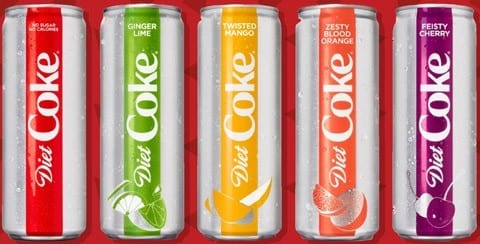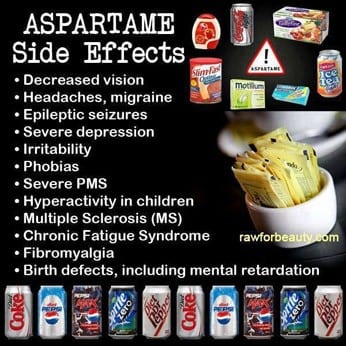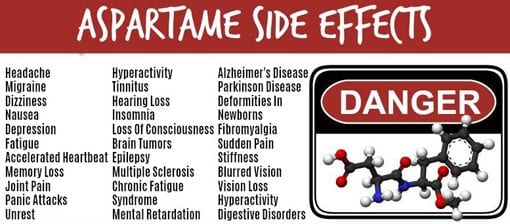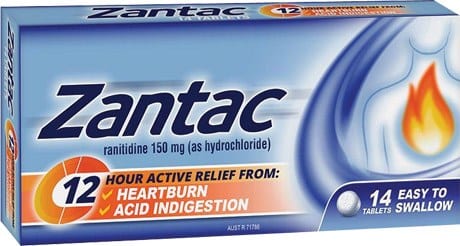The New Diet Coke also Zantac
Blue indicates link
Have you seen the new flavors of Diet Coke? They’ve got enticing names like ginger lime, feisty cherry, twisted mango, and zesty blood orange.
But not so enticing? They also contain a potentially carcinogenic ingredient. It’s an artificial sweetener called acesulfame potassium, Ace-K.
Like aspartame—the artificial sweetener long used in Diet Coke products—Ace-K is a high-intensity sweetener. It’s 200 times sweeter than sugar, so only a tiny amount is needed to achieve the same level of sweetness as sucrose.
(The company’s relaunched traditional Diet Coke, which will now be sold in a taller and skinnier can, will continue to be made with aspartame as the sole sweetener.)
Chemists discovered Ace-K in the 1960s, but the FDA didn’t approve it until 1988. The agency says studies “support its safety.” But critics warn that it isn’t well-studied enough to warrant mass consumption.

Ace-K’s Disturbing Cancer Link
Other experts, however, are convinced that Ace-K is dangerous and should be banned. They point out that the sweetener is a potassium salt containing the known carcinogen methylene chloride.
Although Ace-K is the least-studied of all artificial sweeteners, some early research showed a link to cancer in lab animals. In addition to cancer, long-term exposure to methylene chloride is linked to nausea, headaches, mood problems, impairment of the liver and kidneys, and vision problems.
New Taste, Same Dangers
Artificially sweetened drinks are strongly linked to a higher risk of stroke and dementia, according to a 2017 study published in the American Heart Association’s journal Stroke.
Researchers at the Boston University School of Medicine found that subjects who drank one artificially sweetened beverage per day were almost three times as likely to either have a stroke or be diagnosed with dementia.
Heather Snyder is the senior director of medical and scientific operations at the Alzheimer’s Association.
“We know that sugary and artificially sweetened beverages are not great for us,” she says. “This study adds strength to that, and also says they may not be great for your brain.”
Save Your Brain—and Body—From Artificial Sweeteners
You don’t have to risk your health to satisfy your sweet tooth. Here are healthy alternatives to artificial sweeteners like Ace-K:
Raw Honey. Look for 100% organic raw honey. If you can purchase it from a local source, even better. The darker the honey, the more nutrients it has.
Blackstrap Molasses. Not to be confused with regular molasses, blackstrap is a byproduct of sugar cane. It’s loaded with healthy minerals and releases its sugar slowly. This will keep your blood sugar levels in check.
Stevia. This low-calorie natural substance is made from the leaves of a plant native to South America. Its glycemic index is zero, so it won’t spike your blood sugar. Make sure to buy organic.
Even though that zero-calorie cola sounds like the wiser pick, have you ever actually read the ingredient label? Probably not. So we pulled the ingredients of a Diet Coke right off of its bottle: carbonated water, caramel color, aspartame, phosphoric acid, potassium citrate, natural flavors, citric acid, and caffeine. You already know about carbonated water and caffeine, so we broke down the other four mystery ingredients and inspected what’s really in your Diet Coke.
Caramel Color
“Caramel color is made by a process involving the heating of corn or cane sugar and other carbohydrates to achieve the desired color.” — Coca-Cola Co.
Science weighs in: “Caramel color sounds innocent, but it’s not,” says Alexandra Caspero, R.D., owner of weight management and sports nutrition service Delicious-Knowledge.com. Research published by the federal government’s National Toxicology Program showed that long-term exposure to 4-methylimidazole—a contaminant in the caramel coloring—led to an increase in lung cancer in male and female mice. These findings resulted in the addition of 4-MEI to California’s Proposition 65 list of carcinogens.
What’s more, in 2011, the International Agency for Research on Cancer also concluded that caramel coloring is possibly carcinogenic to humans. And while caramel coloring is in a host of products (like baked goods and soy sauces), the frequency of how much we consume soda makes it more of a concern, says Caspero.
Aspartame:

Aspartame is a low-calorie sweetener made primarily of two amino acids: aspartic acid and phenylalanine. Aspartame has been shown to be safe for everyone, including children and pregnant women. When used in foods and beverages a warning on the labels is provided to people who can’t metabolize aspartame.” — Coca-Cola Co.
Science weighs in: “There are many conflicting studies on the safety of aspartame, says Caspero. Animal studies show more of an increase in cancer risk than human studies have. But there is definitely enough of a connection to avoid or limit your exposure to the additive, she explains.
Asked in Food Safety, Sugar and Sweeteners, Aspartame
Is it safe to have aspartame while pregnant?
No, aspartame is harmful and poisonous.
Plus, the low-calorie sweetener may actually be tricking your body into weight gain. “Some studies suggest that when our taste buds sense sweetness, the body expects a calorie load to accompany it. When that doesn’t happen, it may cause us to overeat because we crave the energy rush our body was expecting,” says Cheryl Forberg R.D., author of Flavor First.
What’s more, artificial sweeteners might also dull your taste buds, meaning you eat more high-flavor, high-calorie foods to satisfy your cravings, explains Forberg.
Phosphoric Acid
“Phosphoric acid is used in certain soft drinks, including Coca-Cola, to add tartness to the beverage. Phosphoric acid contains phosphorus, one of the basic elements of nature, and an essential nutrient. Phosphorus is a major component of bones.” — Coca-Cola Co.
Science weighs in: The acid in this ingredient is what erodes tooth enamel, Caspero says.
Additional research has also linked excessive exposure to additional adverse health issues. For example, according to a study in the journal Epidemiology, drinking two or more colas a day—diet or regular—was associated with a twofold risk of developing kidney disease. The culprit? The researchers indicated that although the exact cause is unknown, the phosphoric acid in colas has been associated with urinary changes that promote kidney stones. (When left untreated, they can lead to chronic kidney disease).
Please know, that there are two sides to every story. Aspartame is one of the most investigated artificial sweeteners out there. The FDA has approved it saying it is safe. Is it worth the risk though?
Aspartame is one of the most feared and maligned food additives in history.

The European Food Safety Authority has just published research that concludes that consuming artificial sweeteners, which have been used extensively for more than three decades, is perfectly safe for the vast majority of people. The EFSA said that the acceptable daily limit for aspartame is 40 milligrams per kilogram of body weight. Considering that a can of Diet Coke contains about 180 mg of aspartame, and the average adult weighs about 70 kilograms (or 154 pounds), a quick mathematical calculation will reveal that you can drink about 16 cans per day without worry.
Moreover, the EFSA said that aspartame becomes toxic only once you consume 4,000 mg/kg of body weight – or about 1,600 cans of Diet Coke a day.
What are the harmful effects of Diet Coke?
The most recent headlines have raised concerns that diet sodas boost stroke risk. Diet and regular sodas have both been linked to obesity, kidney damage, and certain cancers. Regular soft drinks have been linked to elevated blood pressure.
Dangers of Zantac:

Using Zantac may increase your risk of developing pneumonia. Symptoms of pneumonia include chest pain, fever, feeling short of breath, and coughing up green or yellow mucus. Talk with your doctor about your specific risk of developing pneumonia.
Ask a doctor or pharmacist if it is safe for you to take this medicine if you have kidney disease, liver disease, or porphyria.
Before using Zantac
Do not use Zantac if you are allergic to ranitidine.
Heartburn is often confused with the first symptoms of a heart attack. Seek emergency medical attention if you have chest pain or heavy feeling, pain spreading to the arm or shoulder, nausea, sweating, and a general ill feeling.
Ask a doctor or pharmacist if it is safe for you to take this medicine if you have:
- kidney disease;
- liver disease; or
- porphyria (a genetic enzyme disorder that causes symptoms affecting the skin or nervous system).
Ranitidine is not expected to be harmful to an unborn baby. Tell your doctor if you are pregnant or plan to become pregnant during treatment. Ranitidine passes into breast milk. Do not take Zantac without telling your doctor if you are breast-feeding a baby.
Zantac side effects:
Stop using this medicine and get emergency medical help if you have any of these signs of an allergic reaction to Zantac: hives; difficulty breathing; swelling of your face, lips, tongue, or throat.
Stop taking Zantac and call your doctor at once if you have a serious side effect such as:
- stomach pain, loss of appetite;
- dark urine, jaundice (yellowing of the skin or eyes);
- fever, chills, cough with mucus, chest pain, feeling short of breath;
- fast or slow heart rate;
- easy bruising or bleeding; or
- problems with your skin or hair.
Less common Zantac side effects may include:
- headache (may be severe);
- drowsiness, dizziness;
- sleep problems (insomnia);
- decreased sex drive, impotence, or difficulty having an orgasm; or
- swollen or tender breasts (in men);
- nausea, vomiting, stomach pain; or
- diarrhea or constipation.
Well, I did go online to see if I could buy Zantac, and I could not. In fact, this is a statement I found released by Zantac.
Zantac Voluntary Recall:
We know there’s been a lot of recent news about Zantac. At Sanofi, patient safety and the quality of our products are our top priorities. Evaluations of the product are ongoing, however, due to inconsistencies in preliminary test results of the active ingredient used in Zantac, Sanofi has, as a precautionary measure, made the decision to conduct a voluntary recall of Zantac in Canada and the U.S. as the investigation continues.
Well good for them. Kind of closing the barn door after the horse has got out.
Personal Note:
Please, most of us have an internet connection. Do your research before you take anything that may be controversial. Seems everyone is happy with the new Diet Coke. The information here about aspartame seems to be inconclusive. It is your decision.
Thank you for reading,
Michael.
Comments are welcome.
It doesn’t really matter how many different versions of Coca Cola they make, it will never ever be goo for you. Have you ever tried to use Coca Cola to clean stuff? Or put a mentos inside a bottle? Just imagine what it does to your stomach. Coca Cola is like poison, but does it taste good? You bet it does!
Hi Afonso,
Thank you for your comments. It is the artificial sweeteners that are being used in today’s market. People are counting calories and they end up suffering from some side effect. Cancer being the most prevalent. Never put a mentos inside a bottle of coke, at least not yet.
Love the way you ended your comment. Hopefully will think twice.
Best wishes,
Michael
I used to fall into those artificial sweeteners when I was in my teen, just so that I can lose weight and look like all the super models.
Afterwards, I heard so much about all these researches that the artificial sweetens are so bad for you and it can even give me cancer!
I get it that coca cola is trying to stay relevant but it is not ok to bribe some politicians and feed us all these harmful chemicals. I think we can only find it here in the States. A lot of artificial and high fructose are banned from many countries, Thailand, where I am from is one of them.
I stay away from all the artificial ones like Aspartame and sucralose. I think if you want to consume less sugar the monk fruit and the -ol (sugar alcohol) or stevia are probably the safest at the moment. Still, I think it is best to just stay away from all but these are the lesser of evil.
I have never used Zantac before, that sounds awful. What I usually do with my heartburn is to mix baking soda with some water and drink it. It helps right away. But it is best to not eat right before you go to bed, period.
Thank you for sharing such an informative post! I will have to share this to my coworkers, they love diet coke and they just do not believe me!
Hi Nuttanee,
Thank you for your comments. Glad to hear Thailand has banned these artificial sweeteners. Unfortunately stevia has been linked to kidney damage, just to mention one side effect. I have a post on my site about artificial sweeteners. The most controversial has remained to be aspartame. Calories vs health.
It is amazing the different uses for baking soda. I am glad you mentioned it. At least they have taken Zantac off the shelves, after number of people were able to establish a link to cancer, and it is in the court system suing Zantac.
Best wishes,
Michael
Thank you for sharing this informative article about POSSIBLE DANGERS DIET COKE, ZANTAC. I live in South Africa and have never come across the new Diet Coke with new flavors. I am glad l came across your article and read it and see the dangers of the new diet coke. And I am sure not all of us will risk our health to satisfy our sweet tooth. Great post and warning I will share it with my family and friend, I have bookmarked your article to keep it for the day these diet cokes gets sold in South Africa.
Wishing you best of luck!
Hi Fiona,
Thank you for your comments. Unfortunately it is not only the colas out there that use artificial sweeteners, which is the real cause for concern. I did a post a while ago about the dangers of artificial sweeteners. We live in a world where people put the calorie count before safety concerns. I appreciate you sharing the article, we need to be aware of the toxins that are out. We consume a lot of products that contain some nasty ingredients.
Best wishes,
Michael
Hey there! Thank you so much for sharing this very helpful article. The things you discussed in your article are really very important. Thank you so much for telling about the possible dangers of diet coke. I really had no idea about this. I knew that the non-diet is much harmful, but didn’t knew much about diet coke. I just read your article till the end.
One of my uncle consume diet coke instead of the real one thinking that it won’t harm. I will share this article with him. I will also suggest others to avoid diet coke.
Thanks again.
Hi Fahim,
Thank you for your comments. Huge companies like Coca a Cola, in my opinion influence the FDA. Money talks. What seems to be so controversial is the artificial sweeteners that are used. Sometimes people use them in their coffee or tea.
Artificial sweeteners can be dangerous. Not too long ago a 150 pound, Great Dane dog died by ingesting the artificial sweetener, Xylitol. They say it is not harmful to humans.
I do have a post on the dangers of artificial sweeteners on my site and what they are commonly used in.
We should be aware of what we put in our bodies.
Best wishes,
Michael
Personally I no longer drink soda of any kind. At least not anymore. It seems that everything we consume these days is harmful to us in some way. Years ago they said that if you drank warm Diet Pepsi you would have mental issues and if you were pregnant the chances of birth defects were high. So now I drink water. I know of people that say they don’t like the taste of water. How can someone not like water? If it’s good water, it has no taste.
Hi Carrie,
Thank you for your comments. I know tap water can have a taste. I also believe it is not the best way to go. Good clean water is the best way to go, even wrote a post about it.
Best wishes,
Michael